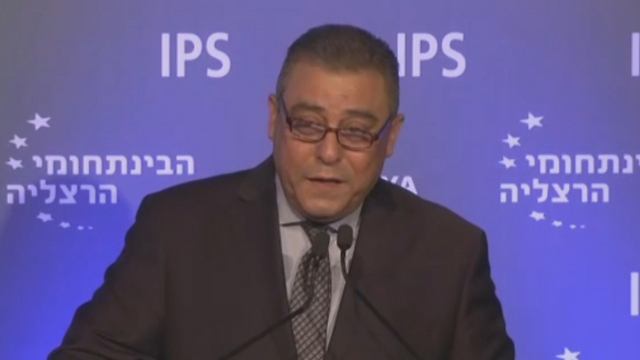
Waiting on Netanyahu
As the Arab world waits for Netanyahu with bated breath, other forces at play are preparing for the moment when all the excuses will fall away and a real effort for peace will begin
An Egyptian, Jordanian, Palestinian and American walk into a crowded hall and each grabs a microphone. It sounds like the start of a joke, and not necessarily one that would bring a smile to your face. But that was exactly what happened three days ago at the Herzliya Conference. Egyptian Ambassador to Israel Hazem Khairat made his first public appearance there and was joined by the generally low profile Jordanian Ambassador Walid Obeidat, Palestinian Standing Cooperation Committee Member Elias Zananiri, and Dr. Robert Danin - an American who has racked up plenty of experience in matters relating to our neck of the woods - all gathered together in an effort to start a dialogue with Israel. To be honest, it was the Palestinian who stole the show.
Each member of the quartet came to offer their own opinion on the Saudi peace initiative that has since morphed into the Arab peace plan - which has yet to receive a concrete response from Israel. We Israelis are experts at announcing that our hands are held out in peace, and yet every prime minister we've had has always run away when it came to plans that were detailed down to the carrot and the stick: full withdrawal in exchange for a true and complete peace. Try finding a leader willing to divide Jerusalem or confront the settlers over this.
Recently, Prime Minister Benjamin Netanyahu had a flash of inspiration: just prior to the good-riddance peace conference in Paris, he and Defense Minister Avigdor Lieberman started hurriedly talking about a different path to peace. Suddenly, they were ready to dust off the earlier Saudi plan and ingratiate themselves with Egyptian President Abdel Fattah al-Sisi - anything to get rid of the French.
After these efforts were shot down, Netanyahu offered up two more initiatives: the first was given by Foreign Ministry Director General Dore Gold, who promised Israel would lap up the peace offer as long as the 57 Arab countries would agree to normalize their relations with Israel and set up economic cooperation between both sides.
The second initiative, promoted by Netanyahu himself, was even more disappointing: instead of delivering a crushing speech that would have presented his view on peace, he decided not to step on stage at the Herzliya Conference. Rather than map out his red lines, he sent out a tape from Jerusalem, reprimanding former defense minister Moshe "Bogey" Ya'alon. Peace is kindly asked to take a seat until things cool down.
It's not as if there are no partners for a dialogue. Al-Sisi in Egypt, King Abdullah II in Jordan, King Salman bin Abdulaziz Al Saud and his heirs in Saudi Arabia, the four rulers of the United Arab Emirates, and Palestinian President Mahmoud Abbas are all waiting to get a reaction from Netanyahu. Through more discrete channels, they have agreed on a new plan by looking at what doesn't sit well and starting a dialogue over the parts Israel finds unacceptable. Changes can be made, as long as everyone agrees to sit down and begin talking with one another. Netanyahu isn't interested in direct negotiations? Moscow, Washington and Cairo would be happy to act as a go-between together with the Saudis. Netanyahu does want face-to-face negotiations? Then by all means, let him set a date and come out with a statement in the press.
Another option is for us to twiddle our thumbs, believe that Abu Mazen and Gaza are no longer relevant, swear that maintaining the status quo is a painless solution and basically sit here and not get ourselves in trouble. Another option is to watch how everyone else starts working together behind our backs, coming to mutual understandings without us being privy to the details, and all the while declaring that Israel will never adhere to outside commands. Or, we could take a look at the Arab peace plan, think a few steps forward and get to work.
It's pretty odd to discover the extent that the Israeli public is unfamiliar with the third option. It is also strange to recognize the extent of the public's apathy toward it. Meanwhile, though, teams from the Israeli Peace Initiative are speaking with those on the other side of this issue to prepare an economic plan, touch upon the sensitive matter of the Right of Return, discuss land swaps and try to agree on a road map that progresses through a system of price and reward. If we're being honest again, no one is guaranteeing us we'll be getting everything we want. The same goes for the other side. The road ahead is long and arduous, but at least we're all out of excuses.











